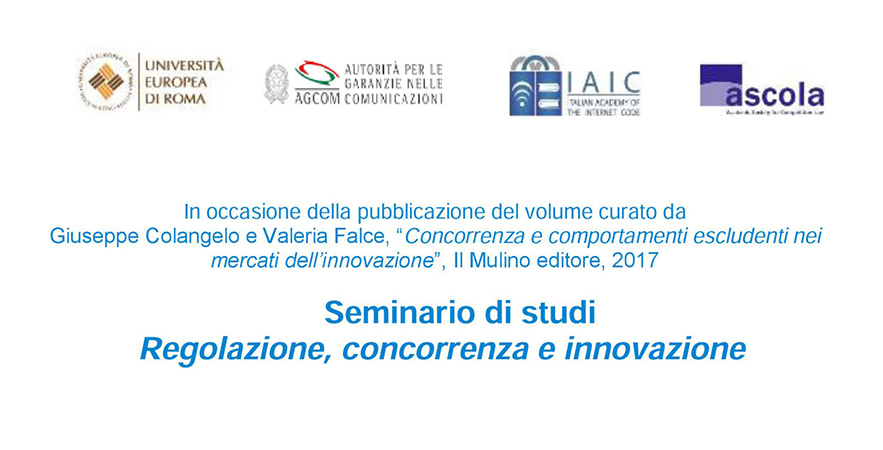10L’incontro, organizzato a Roma dall’Istituto per la Cultura dell’Innovazione, ha messo al centro della discussione le questioni…
“Open Issues on Electronic Commerce: the Digital Identity”, the intervention of Prof. Alberto Gambino
Recent studies conducted by associations of tradesmen and artisans [1] on the relationship between population and the Internet show that Italian SMEs have great room for growth in e-commerce. These data are confirmed by the study “International E-Commerce-Study 2015” which shows that Italy is among the last countries in Europe in terms of investment and spending in e-commerce.
However, the data in terms of the growth of e-commerce in Italy and in Europe show that this sector can be an important vehicle to overcome the crisis. There are many open issues that should be solved, so that e-commerce can realize this potential.
In this perspective, the European Commission on 6th May launched an antitrust competition inquiry into the e-commerce sector in the European Union to identify possible competition concerns affecting European e-commerce markets. It complements actions launched within the framework of the Digital Single Market Strategy adopted in the same day.
The sector inquiry will focus particularly on potential barriers erected by companies to cross-border online trade in goods and services where e-commerce is most widespread such as electronics, clothing and shoes, as well as digital content. More and more goods and services are traded over the internet but cross-border online sales within the EU are growing slowly.
There are indications that many businesses are establishing barriers to cross-border online trade, with a view to fragmenting the EU’s Single Market along national borders and preventing competition. Those barriers may include contractual restrictions in distribution agreements that prevent retailers from selling goods or services purchased online or cross-border to customers located in another EU country.
It’s clear that one of the major barriers to the development of e-commerce can be identified in the agreements and practices of economic operators to restrict competition within the European Union.
So, a first open question can be found in the cross-border competition in the digital environment and the opportunity to adapt to the changed technological environment legal concepts such as the relevant geographical market that today has a different connotation than in the 90s. In fact, the ability to purchase digital goods and digital services throughout the European Union shows that it can not longer refer to the relevant geographical market in the sense traditionally understood.
Therefore, the Commission’s competition sector inquiry will gather market information in order to better understand the nature, prevalence and effects of these and similar barriers erected by companies, and to assess them in light of EU antitrust rules.
Another open question, in my opinion, can be found in consumer confidence in the security of information systems used in financial transactions. The safety detects both in order to avoid the numerous scams and computer fraud, among all the phenomenon of fishing, and in order to ensure the proper processing of consumer data.
A greater attention of all the subjects involved in the definition of how to manage consumer privacy and security of e-commerce platforms it seems to be necessary in order to increase the confidence of those who operate on the market so as to persuade them to make their purchases on e-commerce channels.
For these reasons more and more important it turns out to be the adoption of the regulation on privacy which will set uniform rules throughout the Union. Uniform Rules, applied in the same manner, allowing consumers to trust even the foreign traders, as they know they are covered by the same legislation.
As remarked by the European Commission in the explanatory memorandum of the General Data Protection Regulation: “Rapid technological developments have brought new challenges for the protection of personal data. The scale of data sharing and collecting has increased dramatically. Technology allows both private companies and public authorities to make use of personal data on an unprecedented scale in order to pursue their activities. Individuals increasingly make personal information available publicly and globally. Technology has transformed both the economy and social life. Building trust in the online environment is key to economic development. Lack of trust makes consumers hesitate to buy online and adopt new services. This risks slowing down the development of innovative uses of new technologies. Personal data protection therefore plays”.
In addition to those just mentioned, there are many other “open issues” on electronic commerce and others, I am sure, they will emerge at the end of the conference today.
Only to give a further cue before giving the floor to speakers it seems appropriate to recall the recent public consultation launched on the delivery of postal parcels from the European Commission.
E-commerce deliveries to consumers continue to drive growth in the European parcels market. At the same time, consumers and e-retailers raise increasingly high expectations of delivery services when buying online. However, a lack of delivery features and high prices are obstacles for both e-retailers and consumers, hindering their further participation in e-commerce growth, particularly across borders. These barriers have already been acknowledged by the European Commission in the Green Paper on an integrated delivery market to boost e-commerce in the EU and in the Commission’s roadmap for completing the single market for parcel delivery. The scope of this consultation covers packets and parcels for delivery within Europe.
[1] Confartigianato, “Va dove ti porta il digitale”, May 2015.



